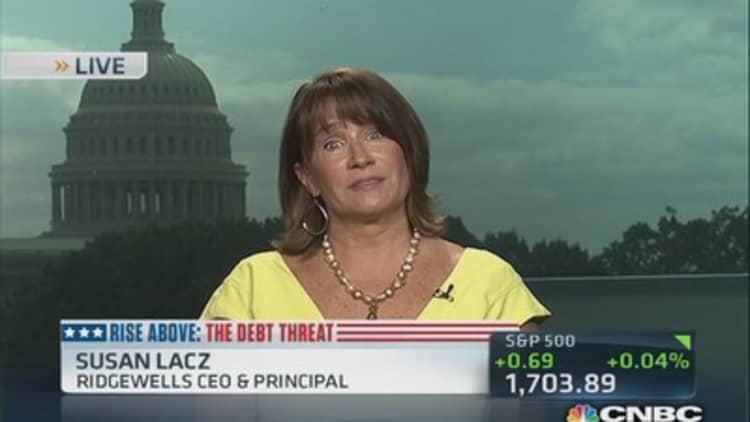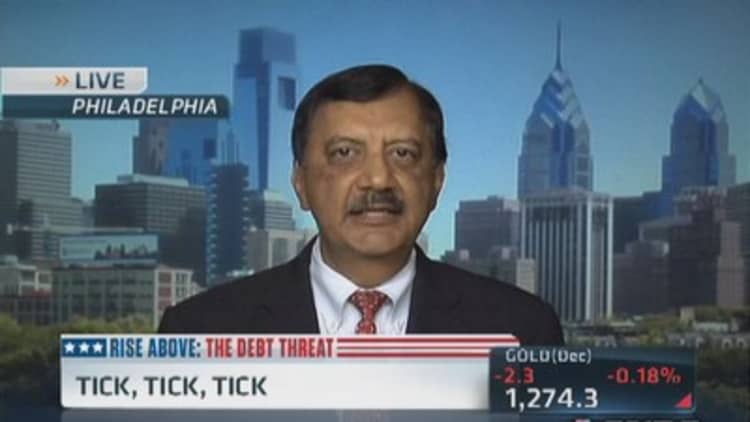
The stories keep piling up about the shutdown's slamming private business. It's clear: If you do business with a federal agency, it's highly unlikely that your invoices will be paid until the government reopens. Even having a physical "in" with Congress doesn't help.
That is the story of one business that literally serves the House of Representatives: Its caterer, which can't get access to the kitchen.
Ridgewells Catering has been operating for nearly 90 years, with clients ranging from the White House to K Street lobbyists. Perhaps its most important account is the House, whose exclusive caterer is Ridgewells subsidiary CapitalHost. The business has lost more than $200,000 so far during the shutdown.
(Read more: Buffett: Debt limit is 'weapon of mass destruction')
"We have furloughed 30 managers; 32 union employees aren't working, and I'm afraid that 20 more will probably have to lose their jobs next week as well," said Susan Lacz, Ridgewells' CEO and member of CNBC's YPO Chief Executive Network, who spoke with "Power Lunch" on Friday.
Lacz's main concern isn't her company's revenue loss but those employees who live paycheck to paycheck and now must figure out how to make ends meet during this crisis.
"I worry about what they are going to do next week to pay the gas bill, to pay the rent," she said.
Ridgewells has seen across-the-board revenue losses as governments and private companies alike forgo parties and other special events. Many business clients are government contractors dependent on federal dollars to maintain operations. Additionally, rented government venues such as the Smithsonian museums have been shuttered.
(Read more: Living on 5,000 a year, on purpose)
Holiday party activity is also going away, according to Lacz.
"I am mad," she said. "Holiday parties are starting to cancel, and that is not acceptable. ... People are a little gun-shy; they are just not ready to entertain. Especially when we rely so much on the government here in Washington."
The latest report from the National Federation of Independent Business found that small business optimism dropped incrementally in September.
Though it's described as "statistical noise" by Bill Dunkelberg, chief economist at the National Federation of Independent Business, the dip does show how quickly owners start to worry when there is turbulence in Washington. The No. 1 reason given for the decline was uncertainty.
"Prospects for politicians and policymakers 'getting it right' are low, and job creators are rolling their eyes and shaking their heads," Dunkelberg said.
(Read more: Straight talk from a small business crippled by shutdown)

We only have to look to the shutdown in 1995 to dispense with any surprise at the ripple effects—as well as to see that the nation's capitol doesn't need to end up in a spot in which Congress can't eat and the grinch is set to steal holiday parties.
After that event, a 1997 Congressional Research Service report stated that leaders were floating legislation to prevent future shutdowns. It claimed that supporters of such legislation wanted to make significant changes because "... the negative impact of the 1995-96 federal shutdowns on both the public and private sectors was so great that future shutdowns should not be permitted."
Congress has made a number of attempts to prevent "future shutdowns."
In 2011 the House voted on the Government Shutdown Prevention Act of 2011. The mission of the bill, introduced by Rep. Steve Womack (R-Ark.), was "to prevent a shutdown of the government of the United States, and for other purposes."
It also contained a notable provision that would have stopped congressional members from getting paid during a federal shutdown. The bill passed the House with 221 votes but died in the Senate.
(Read more: Government workers the real victims of shutdown)
Another prevention effort was introduced in the Senate last January by Republican Sen. Rand Paul (R-Ky). There was been no movement on the bill.
Though a deal's being voted on and getting to President Barack Obama's desk by late Wednesday looked possible at midday, business owners like Lacz are concerned that the clock has ticked down so perilously close to a default that would send things spiraling out of control.
Her message to Congress is clear, "Get your act together. ... We need to get small businesses like Ridgewells and CaptialHost back to work."
—By CNBC's Anthony Volastro




